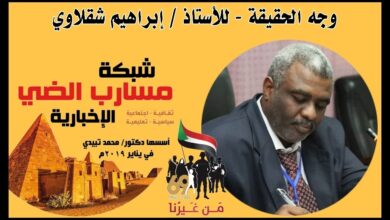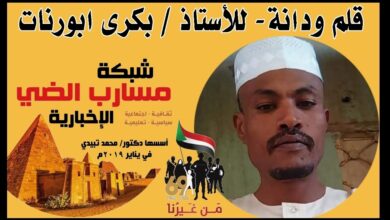
⭕ Masarib Alddi
Dr. Mohamed Tabaydi
🛑 “The Victory of the Oppressed, the Elderly, Women, and Children” – Diqlo’s Journey from the Majesty of Power to the Specter of Defeat
Abdelrahim Diqlo, the second-in-command of the Rebellious Rapid Support Forces militia, caught widespread attention during the militia’s uprising, positioned between the dazzling lights of fame and the looming shadows of failure.
Abdelrahim Diqlo, the second-in-command of the Rebellious Rapid Support Forces militia, emerged as a figure of broad resonance during the militia’s revolt. At the peak of his ambitions, he resolved to breach the walls of the Northern State and place it squarely before his eyes—a bold vision that, if realized, would have left his mercenaries utterly shattered. Diqlo advanced with his forces, supported by the latest armored vehicles, state-of-the-art military equipment, and unparalleled weaponry that, in his view, could potentially enable him to occupy the entire world.
Behind him stood clear international and regional backing—especially from neighboring countries, the African Union, the organization “Iqad and the Silence of Arabs and Muslims,” and the Arab League. This network of supporters transformed the conflict into a complex tableau that elicited both scrutiny and sympathy for the nation’s army.
Diqlo was not alone on his journey; he was bolstered by international and regional entities capable of mobilizing political and regional blocs in multifaceted ways. This support reinforced the militia’s strength despite all challenges, making it appear as a formidable military force on the scene—one with the potential to redraw the map of Sudan. However, despite his advanced military equipment and excessive optimism, Diqlo faced a series of field defeats.
In a scene reminiscent of someone treading on thin ice, his progress faltered with every attempt to advance. He was forced to retreat from the Al-Jili refinery, from Sennar State, Al-Jazeera, Khartoum, and even from the city of Al-Fashir—where the resistance endured for over a year, steadfastly refusing to yield.
Thus, Diqlo’s military campaign turned into a continuous journey of retreat, his ambitions becoming a faint voice against the roaring winds of resilience exhibited by the armed forces. In what some dismissed as a mere display of power, the dawn of popular resistance broke forth. The Al-Bara’a and Mujahideen Brigades led the charge, supporting the armed forces and security apparatus in safeguarding the wounded nation.
Victory ultimately became the ally of the oppressed, the elderly, women, and children, as well as every honorable person who took up arms in defense of both land and dignity. It was as though the popular resistance had become an impregnable barrier that thwarted the success of Diqlo’s terrorist militia amid the chaos of Sudan’s partition—a chaos that some mercenaries and agents sought to inflame, in defiance of the “State of Evil” that aimed to dismantle national unity.
The trajectory of Abdelrahim Diqlo remains a testament to the struggle between rebellious ambition and steadfast popular strength—a struggle in which the scales of power ultimately tipped against him, despite his belief that he could conquer the world with his equipment and weaponry. In the end, the popular resistance proved that the land is not granted to aggressors but is seized by the sweat of the resolute and the blood of heroes, making the victory of the oppressed an everlasting echo in the annals of the nation’s history.

